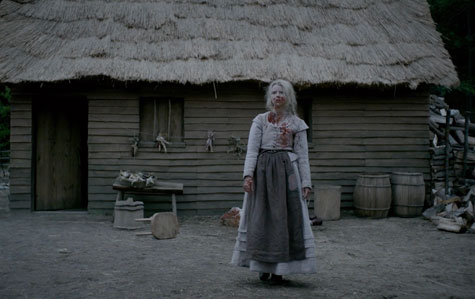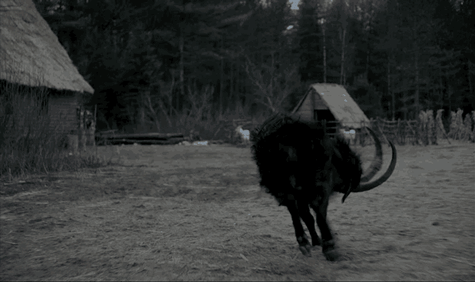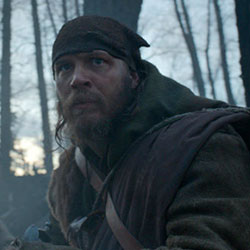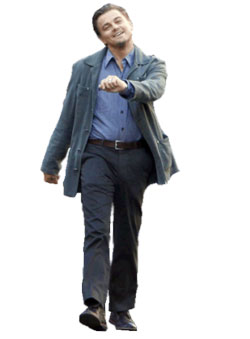
We all know the Salem Witch Trials; in 1692 a peculiar madness overcame the Massachusetts town and culminated in the execution of nineteen people by hanging and one by pressing, crushed to death under the weight of stones. The terror for us comes in knowing that there are no witches. Families and neighbors turned upon one another, witchfinders declared moles and birthmarks to be “witch’s teats,” and barn animals were persecuted as familiars to the Devil.
The polarizing horror film The Witch could have gone the Arthur Miller route and made this a story of fear, religious terror in the face of the unknown, and human betrayal, but instead we see the world through Puritan eyes. The Devil walks the earth, tempting sinners, and witches steal our children to make flying ointments from their blood.
In the first ten minutes, we meet a family of religious outcasts who leave the safety of their village over a difference in the interpretation of scripture; we are thrust into their hardscrabble lives as farmers on the edge of a dark forest; and we see young Thomasin playing peekaboo with her baby brother, only to open her eyes and find that the babe has vanished.
A wolf. A wolf has taken him, their mother cries in her grief. A terrifying enough tale could be told by leaving his disappearance ambiguous, but The Witch does not leave it to our imagination. We see a gnarled old woman rushing through the woods with a swaddle in her arms, and the enactment of a repugnant rite we’ve only heard described in tales meant to frighten children from walking alone in the dark.
Baby William will not be found. He will not be coming home. And there will be no wolf found prowling the wood. The closest you’ll get to a monster is Black Phillip, the family goat, with whom the children play.

The horror of not knowing his fate slowly tears the family apart, abetted by the witch and, surely, Satan himself. The family loves each other but crumbles slowly. The jealousy of an aging mother for her young daughter, the anger of a hard-worked older sister toward her mischievous siblings, sexual tension pitted against religious shame—as a young brother and sister seek to unravel the mystery of their brother’s abduction, all of this chips away at their sanity in this bleak and lonely place.
They speak in the English of the time, and speak to God and beg his mercy. Writer-Director Robert Eggers does not once wink at the audience or portray them as misguided. We are in their world—where the devil is real and our only hope is to throw ourselves on the mercy of our Lord. Filmed in natural light and with gritty realism, I found myself immersed in the story, the spell only broken when a fellow audience-goer lit up the dark with his phone.
The Witch is only 90 minutes long, with little music, and commands your attention. Compared to another recent period piece, The Revenant, it is spare yet powerful.
I enjoyed the mountain man story of a bear attack and betrayal, and survival against unlikely odds, but found it overlong, pretentious, and indulgent. The hyped bear attack comes off as movie magic, while the ending of The Witch, which could not happen in our world, looked hauntingly real and remains frozen in my mind.
Perhaps seeing Werner Herzog’s Grizzly Man made The Revenant less terrifying.
 DiCaprio’s performance was good enough, but the spacey interludes as he reminisced about his wife took away from the gritty realism the story was meant to convey. It felt more like an amusement park ride, as Mr. Glass tumbled down the Pacific Northwest toward his revenge. Tom Hardy operated on a different plane than the rest of the cast. Everyone in The Witch was in synch, while Hardy’s intensity made poor Leo’s Oscar-grasping all the more obvious. (And it worked.)
DiCaprio’s performance was good enough, but the spacey interludes as he reminisced about his wife took away from the gritty realism the story was meant to convey. It felt more like an amusement park ride, as Mr. Glass tumbled down the Pacific Northwest toward his revenge. Tom Hardy operated on a different plane than the rest of the cast. Everyone in The Witch was in synch, while Hardy’s intensity made poor Leo’s Oscar-grasping all the more obvious. (And it worked.)
Alejandro González Iñárritu is a great director, but the ambiguous visions of Birdman had no place here. Whereas the brief flashes of the supernatural made The Witch a perfect terror, the dreamy visions of The Revenant distracted from its story.
We weren’t seeing this through the eyes of a mountain man from the 1820s, but through a modern viewer’s. The attacks by natives have to be explained—their leader is looking for his abducted daughter—who Glass inadvertently helps escape. The bear attacks because Glass gets between her and her cub. Everything has a reason. The only one we needed was Fitz betraying him out of cowardice, which is subverted by the end; Fitz has to become craven so Glass’s revenge can be pure.
 True, it is a story where no good deed goes unpunished, but also one where rugged individualism and white saviors will prevail. The scenes with the French and the natives rang truest, but Glass and Captain Henry never felt like they walked out of history—maybe the Warner Brothers back lot. Hardy was the only familiar face that disappeared into his role. It was a good film, but missed being great.
True, it is a story where no good deed goes unpunished, but also one where rugged individualism and white saviors will prevail. The scenes with the French and the natives rang truest, but Glass and Captain Henry never felt like they walked out of history—maybe the Warner Brothers back lot. Hardy was the only familiar face that disappeared into his role. It was a good film, but missed being great.
The Witch had the advantage of unknown performers. It has been accused of taking “less is more” too much to heart and having nothing, but it is never ambiguous. The devil is real. Witches steal our children. And God’s mercy only saves us in the next world.
It is a far bleaker picture than The Revenant, if you can stomach believing what the Puritans did—that evil is within us all, and we can be tempted into the vilest atrocities when everything has been taken from us. Not since The Blair Witch Project has a horror movie been so polarizing. And if this one makes you ill, it won’t be from the shaky camera, but from its unflinching eye.
Have you seen either film? What did you think?
Thomas Pluck is the author of the World War II action thriller Blade of Dishonor, Steel Heart: 10 Tales of Crime and Suspense, and Hot Rod Heart: A Noir Novelette. He is also the editor of the anthology Protectors: Stories to Benefit PROTECT and hosts Noir at the Bar in Manhattan. His work has appeared in The Utne Reader, PANK Magazine, McSweeney's Internet Tendency, Hardboiled, Needle: A Magazine of Noir, Crimespree, and numerous anthologies, including Dark City Lights, edited by Lawrence Block. You can find him online and on Twitter as @thomaspluck.
Read all of Thomas Pluck's articles for Criminal Element.
